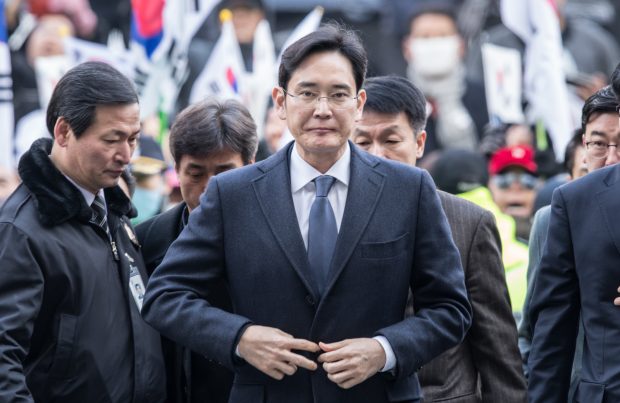The aftermath of Lee Jae-yong’s arrest

SEOUL, Feb. 16, 2017 (Xinhua) — Samsung Electronics Vice Chairman Lee Jae-yong (Front) enters a Seoul court for hearings in Seoul, South Korea, on Feb. 16, 2017. The heir apparent of Samsung Group, South Korea’s largest family-run conglomerate, on Thursday appeared in hearings at a Seoul court, which will decide whether to issue an arrest warrant for him sought by prosecutors.
(Xinhua/Lee Sang-ho)
Lee Jae-yong, vice president of Samsung Electronics and heir of the first South Korean conglomerate, was arrested in connection with the corruption scandal that threatens to topple the country’s suspended president, Park Geun-hye.
The sequence of events is related to the scandal of corruption and other crimes involving the president Park Geun-hye and her confidant Choi Soon-sil (who is under arrest). Mr Lee is accused of paying $36 million in bribes to Choi Soon-sil, in return for political favors. While prosecutors decide whether to indict Lee, he will be forced to swap his $4m mansion in Seoul for a 6.65 sq m cell. From his single cell, he does not have permission to speak with any other prisoners. Mr Lee already avoided arrest in January, when the judge had rejected the prosecutors’ request because of insufficient evidence.
“We will do our best to ensure that the truth is revealed in future court proceedings,” Samsung said in a statement. The company is South Korea’s largest business group and its revenue is equivalent to about a fifth of the country’s GDP. The Korean consumer electronics giant Samsung was founded way back in 1938 by Lee Byung-chul as a commodities investor. In the subsequent 30 years, he tried to enter in many market niches, including food processing, textiles, retail, and insurance provision, before recognizing the growth of the electronics industry in the late 1960s. Not wanting to stray too far from the apple tree, the following generations were also actively involved in the Samsung history. This business structure has its roots in Korea and is known as a chaebol, which translates literally as “business family”.
After the arrest, the group’s flagship Samsung Electronics slid 0.4 percent while its de-facto holdings firm, Samsung C&T, dropped by two percent and another key unit, Samsung Life Insurance, fell 1.4 percent. From the other side, Professor Yoon Chang-hyun of the business administration department of the University of Seoul said: “As a large conglomerate, Samsung is run under a systemized structure. This means there will no heavy impact in the short-term”. Also, Patrick Moorhead, president at Moor Insights and Strategy based in Texas, declared: “I don’t see any short- term impact. Certainly, there’s nothing positive about the news. Lee Jae-yong is not the global face of the brand. Lee isn’t really involved in the day-to-day activities and Samsung followed a stovepipe organizational structure where each unit is a business itself. Lee isn’t a part of operations.”
If apparently at the global level the arrest does not stir up huge emotions, in Korea the situation is quite different. South Koreans have grown increasingly fed up with corruption scandals. In fact, when huge crowds took to the streets in recent months to demand Ms. Park’s impeachment, they also called for the arrest of Mr. Lee and other chaebol leaders.
But chaebols scandals are not something new in South Korea. It is relevant to mention the case of the Lotte chairman Mr. Shin, the story of Hyundai chairman Chung Mong-koo and even the example of a previous Samsung chairman Lee Kun-hee who was pardoned in 2008 after being found guilty of criminal tax evasion. These corruption phenomena closely linked to the government sound senseless for European ears but they are part of the culture of the country. However how long will it work in this way? In 2016 the young Korean democracy started asking for more transparency in the government system and the chaebols system too. Excited crowds held candles aloft every weekend for several weeks.
The considerations that I have presented suggest that for now it is only a domestic crisis. Even if this is a serious reputation problem in Korea, Samsung is still one of the best global brands. Out of South Korea, the credibility of the company may be more affected from Galaxy Note 7 battery explosions than from Mr Lee’s arrest. What will be next for Samsung is difficult to say: maybe only filling the political vacuum of Korea, there will be chance to reshape the chaebol system.
Alessandra Bonanomi – The AsiaN Media Intern





















































